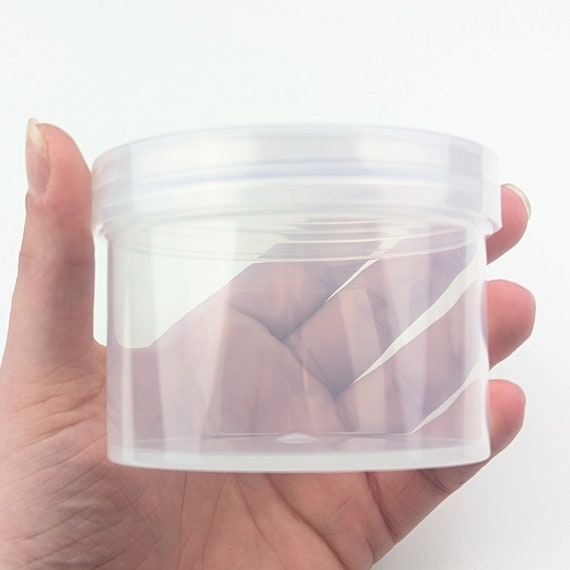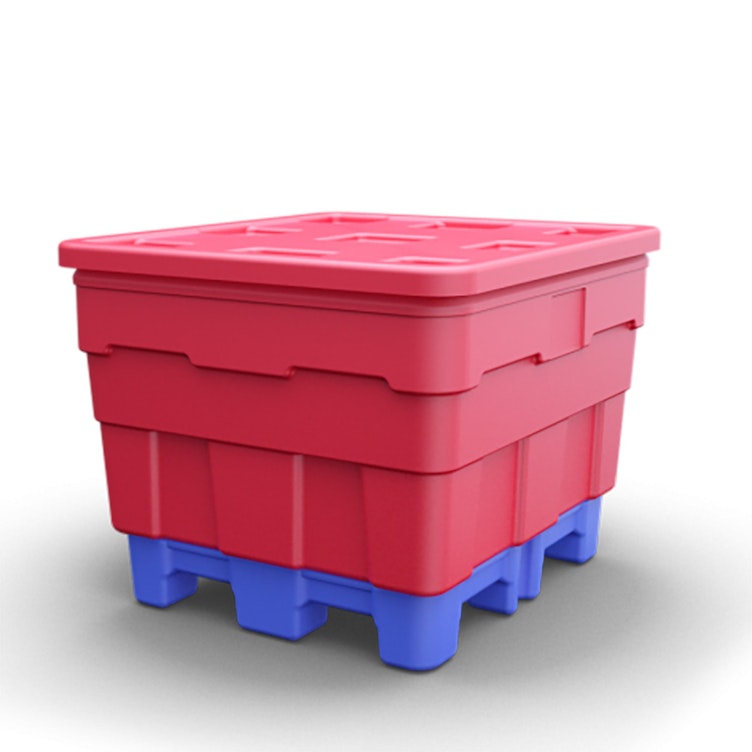A Comprehensive Overview to the Various Sorts Of Mass Plastic Containers Available Today
Bulk plastic containers play a critical role in numerous markets, providing services for storage space and transportation. Their varied kinds deal with different requirements, from inflexible options for strong products to flexible containers suiting numerous forms. Each kind provides distinct advantages, making it important to recognize their features and applications. As sectors advance, so do the demands for reliable container remedies. What factors should one consider when picking the best mass container?
Review of Mass Plastic Containers

Sorts Of Bulk Plastic Containers
Bulk plastic containers been available in numerous forms, each suited to certain applications. Inflexible bulk containers, adaptable mass containers, and intermediate bulk containers represent the main classifications, each offering one-of-a-kind advantages. Comprehending these kinds is vital for picking the appropriate container for moving and saving materials.

Stiff Mass Containers
Rigid bulk containers are critical for effective storage space and transportation of different materials across industries. These containers are usually built from long lasting plastics, allowing them to endure extreme handling and ecological conditions. They are available in different shapes and sizes, consisting of drums, bins, and totes, making them ideal for saving every little thing from granular materials to fluids. Inflexible containers commonly feature enhanced walls and safe and secure covers, ensuring the materials continue to be safeguarded throughout transportation. Their stackable style makes best use of storage space, making them excellent for storage facilities and manufacturing facilities. Furthermore, lots of inflexible mass containers are multiple-use and recyclable, adding to sustainability efforts. Generally, their effectiveness and convenience make stiff bulk containers a crucial component in supply chain operations.
Flexible Mass Containers
Adaptable bulk containers, typically described as versatile intermediate mass containers (FIBCs), function as a functional remedy for transporting and saving a variety of dry products. These containers are commonly made from woven polypropylene and are developed to be light-weight yet strong, permitting for efficient handling and stacking. Their versatility enables them to accommodate different shapes and sizes, making them appropriate for products ranging from grains to chemicals. FIBCs can be outfitted with attributes such as spouts for easy dental filling and discharge, in addition to protective finishes for improved sturdiness. Furthermore, they are recyclable and recyclable, adding to lasting methods in markets such as farming, food processing, and building and construction. On the whole, versatile bulk containers use a effective and cost-efficient choice for bulk product management.
Intermediate Mass Containers
Intermediate bulk containers (IBCs) are essential for the efficient transportation and storage space of liquids and granular materials throughout different sectors. These containers usually have an ability ranging from 275 to 330 gallons and are made for easy stacking and handling. Made from durable products like high-density polyethylene or steel, IBCs provide outstanding defense against contamination and environmental factors. Their design consists of functions such as a built-in pallet for forklift accessibility and a removable top for easy dental filling and cleansing. IBCs are extensively made use of in chemical, food, and pharmaceutical industries, making certain compliance with security regulations. Their flexibility and reusability make them a cost-efficient solution for bulk storage and transportation, adding to provide chain performance and sustainability.
Attributes and Advantages of Mass Plastic Containers
Bulk plastic containers are important tools in various industries, supplying a mix of longevity and functionality. These containers are created from top notch materials, making them immune to effects, chemicals, and environmental variables. This toughness guarantees product safety during storage space and transport.
In addition, mass plastic containers are light-weight, helping with ease of dealing with and reducing delivery costs. Their stackable layout makes best use of storage space efficiency, permitting for maximized warehouse area. Several versions feature secure lids or closures, supplying an impermeable seal that avoids and protects contents contamination.
In addition, bulk plastic containers are usually reusable and recyclable, adding to lasting methods. Their adaptability permits a large range of applications, from food storage to commercial use, improving their value across sectors. Companies benefit from the long life-span and low maintenance demands of these containers, making them an affordable remedy for both temporary and long-lasting demands.
Industries That Make Use Of Mass Plastic Containers
Various industries profit from making use of bulk plastic containers, each leveraging their distinct properties for particular applications. The food and drink industry counts on these containers for safe storage space and transport of products, while the chemical production sector uses them for managing unsafe materials. Furthermore, the pharmaceutical circulation needs stress the relevance of toughness and sanitation in product packaging services.
Food and Beverage Industry
As the need for reliable and risk-free storage services remains to climb, the food and beverage industry progressively relies upon mass plastic containers for their operational needs. These containers offer robust, lightweight, and flexible choices for saving active ingredients, ended up items, and waste products. Made from food-grade materials, they guarantee conformity with health and wellness standards. Different layouts, such as stackable bins and carry boxes, maximize area throughout transportation and storage, boosting logistical effectiveness. In addition, the openness of some mass containers permits for easy stock management, decreasing the danger of perishing. With the market's concentrate on sustainability, many producers are now supplying recyclable and multiple-use options, aligning with environment-friendly practices while fulfilling the high demands of food security and hygiene.
Chemical Production Sector
The chemical manufacturing sector depends heavily on mass plastic containers for the risk-free and efficient storage space of raw products, intermediates, and finished products. These containers are designed to hold up against various chemicals, making certain that unsafe materials do not leak or weaken the container itself. Typical kinds include high-density polyethylene (HDPE) and polypropylene containers, which use outstanding chemical resistance and durability. Their light-weight nature and stackable layout assist in transportation and storage space, enhancing room in manufacturing facilities. Additionally, numerous mass plastic containers come with attributes such as tamper-evident seals and easy-to-read labeling, enhancing safety and security and compliance with industry policies. Overall, mass plastic containers are important to the chemical production procedure, providing reliable solutions for managing varied compounds.
Pharmaceutical Circulation Requirements
Pharmaceutical distribution counts on bulk plastic containers to fulfill strict safety and governing needs. These containers are vital for keeping a range and transporting of pharmaceutical products, consisting of active pharmaceutical active ingredients (APIs) and completed medications. Their layout warranties defense against dampness, light, and contamination, preserving the integrity of sensitive products. Additionally, mass plastic containers are certified with market requirements such as Excellent Production Practices (GMP) and are frequently made from products that are FDA-approved. The use of these containers enhances efficiency in the supply chain, enabling secure, large-scale distribution while lessening waste. Business in the pharmaceutical industry prioritize using durable, watertight, and tamper-evident containers to ensure item safety and high quality throughout click reference the logistics procedure.
Factors to consider for Selecting the Right Container
When selecting the ideal mass plastic container, different aspects should be meticulously weighed to ensure optimal performance and security. The nature of the products to read review be kept is extremely important; compatibility with the container's material can influence integrity and safety. plastic bulk containers. In addition, the container's shapes and size must line up with the storage space and transport requirements, guaranteeing efficient room use
Tons ability is one more crucial factor to consider, as it must accommodate the weight of contents without threat of damages or failing. The style features, such as airing vent or covers, can impact functionality and accessibility. Compliance with sector regulations is vital, especially in markets like pharmaceuticals, where safety criteria are rigorous.
The expected life expectancy and longevity of the container should be assessed to verify it fulfills the functional needs without constant substitute. By assessing these aspects, one can select the most suitable mass plastic container for specific applications.
Ecological Influence and Sustainability
As companies significantly focus on sustainability, the ecological effect of mass plastic containers has actually come under examination. These containers, usually made from products such as polyethylene or polypropylene, add significantly to plastic waste otherwise handled correctly. Their production involves the usage of nonrenewable fuel sources, which can result in increased greenhouse gas discharges. Developments in reusing innovation and the advancement of naturally degradable choices are helping to mitigate these concerns.
Lots of manufacturers are adopting techniques that stress the usage of recycled materials, therefore minimizing the need for virgin plastics. The toughness of mass plastic containers likewise plays a duty; they are created to be reused multiple times, which can decrease their general ecological impact when contrasted to single-use choices. Inevitably, the sector faces the obstacle of balancing functionality with ecological responsibility, making lasting techniques crucial for the future of mass plastic containers.
Ideal Practices for Storage Space and Transportation
Reliable storage space and transport of mass plastic containers greatly affect both functional efficiency and sustainability. To optimize area, companies need to stack containers securely, guaranteeing security and stopping damage. Appropriate labeling is important for simple recognition, which enhances access processes. Furthermore, preserving a tidy and organized storage area lowers the risk of contamination and enhances security.
For transportation, picking the best car is essential; containers need to be safeguarded to avoid changing during transit. Companies should additionally take into consideration making use of pallets to help with less complicated loading and unloading. Regular examinations of containers for deterioration can protect against costly replacements.
Temperature control is one more essential facet, as severe conditions can compromise the integrity of the plastic. Training employees on finest methods for managing and transportation warranties compliance and advertises a culture of security. By carrying out these ideal techniques, businesses can enhance their operational efficiency while adding to environmental sustainability.
Frequently Asked Concerns
Just how Do I Clean Mass Plastic Containers Effectively?
To tidy mass plastic containers effectively, one need to wash them with cozy water, use a light cleaning agent and scrub with a soft brush. Rinse thoroughly, after that permit to air completely dry totally before storage space or reuse.
What Is the Life-span of Bulk Plastic Containers?
The lifespan of bulk plastic containers commonly varies from 5 to 10 years, depending upon the material, usage, and ecological problems. Appropriate maintenance and storage space can substantially prolong their use and toughness in time.
Can Bulk Plastic Containers Be Personalized?

Do Mass Plastic Containers Have Guarantee Options?

Are There Laws for Making Use Of Bulk Plastic Containers?
Yes, regulations exist for using mass plastic containers, primarily concentrated on safety, environmental effect, and material conformity. These regulations ensure that containers satisfy sector criteria and are appropriate for carrying different materials securely and successfully.
Inflexible mass containers, versatile mass containers, and intermediate mass containers stand for the key classifications, each offering one-of-a-kind advantages. Flexible bulk containers, commonly referred to as flexible intermediate bulk containers (FIBCs), serve as a versatile option for saving a variety and delivering of completely dry materials. The chemical production industry depends heavily on bulk plastic containers for the safe and reliable storage of raw materials, intermediates, and completed items. Bulk Plastic Containers. These containers are made to hold up against various chemicals, making sure that harmful products do not leakage or break down the container itself. Furthermore, bulk plastic containers are compliant with market requirements such as Excellent Production Practices (GMP) and are often made from products that are FDA-approved